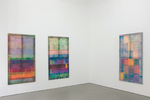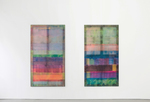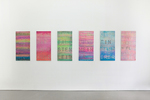Bottna, July 5, 2019
Dear Georg,
When we talked a few days ago, we touched upon many topics. One question led to another, which led to another, and so on. We talked about politics, Georg Kreisler (thank you for telling me about him), paintings that acknowledge their surroundings, the rapid pace with which words grow old today, technology, and the wish to use one’s hands as long as one can.
It was a conversation full of stories and questions – and almost empty of answers. It
made me wonder if ”answers” perhaps not are what we need right now? Don’t we have too much faith in them? Many answers are perfect, in all respects. They are honest, reliable and fact-based. The answers should work, but they don’t. So far, they have neither saved us from an environmental catastrophe, nor from the current alarming political circus.
You said that hardships can radically change one’s life choices as well as one’s appreciation of small things, like croissants. You told me that your own difficulties when you were younger made you ask yourself an important question, which led you to become an artist.
Maybe it is time for us all to begin to ask questions again, to become less certain and a bit more careful. Maybe they can take us to better places, better times, if we dare to follow where they lead us.
I am ambivalent towards the use of words in art (especially paintings). Not in the case of Lee Lozano or Carl Andre, but take Ed Ruscha, for example. When there is a painting with the word ”STANDARD” on a gas station, or the word ”TELEPHONE” on a telephone booth, then I am comfortable, because the words are part of the objects. But when there is a sentence like ”THAT WAS THEN THIS IS NOW” on a cloudy sky, then I become a bit bothered, because I don’t see what the sentence has to do with the sky, but mainly because the text prevents me from seeing the sky. The text is something added that dominates the image: it gives an answer.
This is exactly what doesn’t happen in your works with texts. Why? (Ok, I will try to answer this question despite what I just wrote above.) I think it is because you expand the rift between the written sign and the sound, and between the sound and its meaning. Words become tangible like matter, like acrylic, and aluminium, but also silent and enigmatic. They are transformed into questions (at least until the anagram is solved).
But this is not the only thing that happens. When words fall apart and don’t work like they are supposed to, their hidden background is disclosed, and with it the entire semiotic machinery that turns words and sentences into intelligible wholes. In that sense, the letters and words in your works, are just as translucent as the silk screen fabric that you sometimes use.
My best,
Jens
Letter from Jens Soneryd to Georg Haberler, ”Als der Zirkus in Flammen stand”. July 5–July 13, 2019. Åplus, Berlin.
Å+ Georg Haberler Dossier.pdf
PDF-Dokument [35.3 MB]














